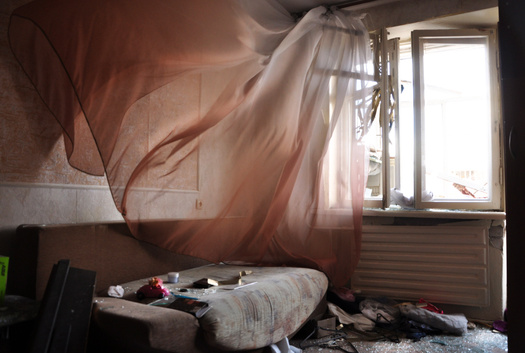
‘Mom, please make it stop’ Meduza special correspondent Lilia Yapparova was in Chernihiv in the final days before Russian troops cut it off from the outside world. Here’s what she saw.
Мы рассказываем честно не только про войну. Скачайте приложение.
In late March, Russia promised to reduce its military activity in Chernihiv and Kyiv; in fact, this was one of the main outcomes of the talks between Russia and Ukraine in Istanbul. Despite that, the Russian army has been laying siege to Chernihiv for almost a week. According to volunteers and local officials, Russian troops have been firing at civilians who try to evacuate the city. Meduza correspondent Lilia Yapparova was in Chernihiv in the final days before the siege began. Below is her account of a city on the verge of humanitarian catastrophe.
A thorn in their side
On the second week of March, Wolf and Chipmunk’s dugout on the outskirts of Chernihiv started to feel very small.
“We had a room dug out in our ditch — about half the of half of my bed,” said Wolf, gesturing toward his hospital bed in his ward at the Chernihiv regional hospital. “And then Sailor and Sniper panicked and joined us. And suddenly, instead of two people, there were four.”
The day before Wolf's story, Sailor and Sniper had been forced to sleep in the trench with two of their fellow soldiers’ corpses due to the constant shelling around them. The next day, they couldn’t take it anymore, so they fled their trench and took shelter in Wolf and Chipmunk’s dugout.
The morning of March 10, Wolf set out for the neighboring trench to remove the “200s”; after that, Sailor and Sniper would be able to return to their trench and free up some space in Wolf’s.
The dead soldiers had been lying there for two days. One of the men’s legs had been ripped off. Carrying them to the evacuation vehicle was a challenge. “The other guys had been too scared to pick him up where his limbs had been torn off,” said Wolf. “My arms were shaking.”
Wolf and Chipmunk’s foxhole was located right in the middle of Russian troops’ path to Kyiv — near Chernihiv, in a village called Novoselovka. “They needed an asphalt road [to transport their equipment] — it would have been impossible otherwise,” she Wolf. “We were like a thorn in their side.”
As they waited for the Russian infantry, the soldiers endured artillery and air fire. The Russians even took a shot at destroying Wolf and Chipmunk’s dugout with tanks — trying to “dig” down to the inside of the dugout by firing shells that exploded on impact, according to Wolf. “They dug a hole straight to us — it was like they knew exactly where our hole was,” he said.
By March 9, there were only about three meters of clay surrounding Chipmunk and Wolf’s dugout. Everything around, according to the soldiers, had “crumbled” under Russian tank fire.
Later that day, the Russians started firing mortar shells at them. “They sent more than ten shells,” said Chipmunk. “I thought about my mom, about my wedding, the daughter’s birth, and the entire war since 2014.” According to Wolf, after his head trauma from the explosions, Chipmunk started repeating the same thing over and over again: “Mom, I don’t want this to continue. Make it stop.”
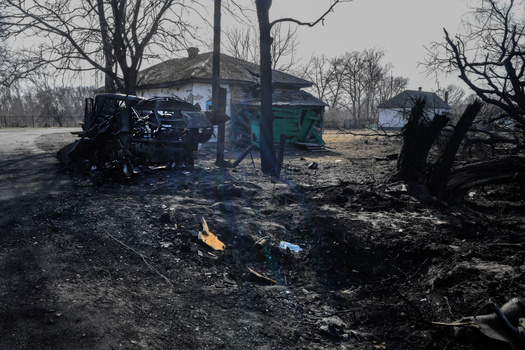
After Chipmunk was brought to the hospital, Wolf stayed alone in the dugout. The following day, the tank fire started again; the next eight shells — Wolf counted — eliminated another meter of the ground that was protecting him.
After the penultimate strike Wolf remembers, his nose started bleeding. The last explosion, just a few moments later, cooked the blood on his face dry. “All I could feel was my nose,” he said. “That’s how strong it was.”
He woke up in the hospital. “When the nurses told me [Wolf] had been brought in, I gathered all my strength and went to his ward, edging along the wall,” said Chipmunk. They both had concussions, and Wolf had been struck by a piece of shrapnel, though now he's in the ward for soldiers with light wounds.
The Ukrainian army managed to stop the Russian army from taking over Chernihiv, so now the Russians are laying siege to the city instead.
Neither the Russian nor the Ukrainian military authorities responded to Meduza’s questions about the events near Novoselovka.
* * *
To avoid the most intense combat areas, vehicles going from Kyiv to Chernihiv sometimes leave the road and drive through crop fields. By now, they’ve left a trail that’s easy to follow. Bumpers torn off by the rough path sometimes crunch under cars’ wheels.
On March 21, black smoke can be seen just over the horizon. The officers at the next checkpoint say Chernihiv has just suffered an airstrike. You can see several fires burning from the city’s entrance.
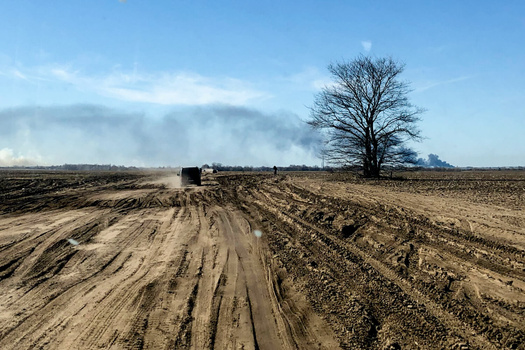
By March 10 — after airstrikes targeting a thermal power station, gas pipelines, and pumping stations — the city is almost completely out of water, electricity, Internet, and cell service, and heat. At night, the only light comes from the stars.
As a result, residents have taken to wearing headlamps. “Conditions right now are like if we went on a hike — a long hike through the city,” says Alexander Malets, one of the dozens of activists organizing food, water, and medicine shipments into the city. “It’s my seventh day without a shower. But there are some districts where people are on their second or third days without drinking water.”
Malets has been sleeping in a bomb shelter in a local school. Before he goes to bed, he and his new roommates gather in the courtyard to talk. You can hear explosions from throughout the city; the sound is like someone slamming an iron door in a long stone hallway.
“I have a gift for you,” says Malets, setting a bullet from a 5.45mm Kalashnikov in my palm. I reflexively put it in my pocket. “I was giving out food packages to some old ladies on Lyubechskaya [Street] when a round of bullets went flying towards the next door over, just 30 meters away from me.”
Another explosion. This time, we hear people screaming, “It’s coming! Duck! It’s landed!” Malets explains that you should drop to the ground whenever you hear a whistle on top of the roar overhead; the louder the whistle, the faster you need to get down.
The shelter
To get into the bomb shelter, you have to go through a hallway that’s lit up with a kerosense lamp. It was brought here from the school museum — unlike the rest of the lamps in the building, which are electric, this one runs on mineral spirits.
About 80 people are living in the school’s basement, all of them without water, heating, or communication with the outside world. Slamming the door, which creates an echo reminiscent of the sound of a bomb, is strictly prohibited.
The only bright light source is an electric lamp on the far end of the shelter. It illuminates targets hung on the walls, diagrams of Makarov pistols, and some illustrations from a magazine called War. Until the beginning of the war, the basement was the site of the school’s Defending the Fatherland class, where students learned how to fire air rifles.
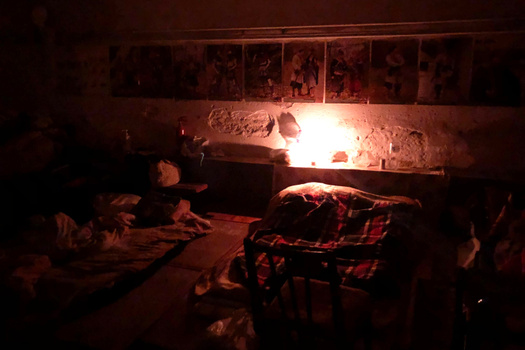
I sit on the floor on top of a mat from the school gym, several blankets, and my vest, and introduce myself to the young woman next to me in complete darkness. The woman tells me I don’t need to shine my phone screen to show my face. “I’ve started to see in the dark a little,” she explains, introducing herself as Nadezhda. “You get used to it. I’ve been here since the first day of the war. I can see you have hazel eyes.
Nadezhda’s parents, Tatyana and Vasily, sit down next to her. Unable to find any water in the city, they managed to extract some sap from a birch tree in a garden next to the school the day before, Nadezhda says with pride.
The family has a fourth member in the shelter, too: Richie, their Yorkshire Terrier. “He’s been afraid of firecrackers since he was little. He spent one night here and realized where he needs to go [when the shelling starts],” Nadezhda explains. “He opens the door with his nose and flies into the basement.”
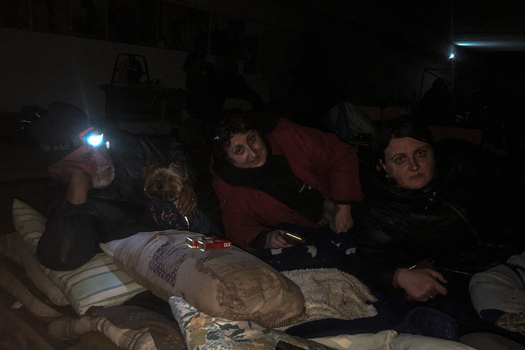
By the end of the first month of war, it was the outside world they had to adjust to, according to Nadezhda. “You go up the stairs, and it feels like something completely new,” she says. “I can just sit [outside], admire the trees, and enjoy the silence — when it’s there. My mind just goes empty.”
With dogs barking and 80 people talking, the basement is noisy; even when they whisper, the residents’ discussions of topics like the increasing price of church candles can get lively. Over by the targets, someone lets out a wet cough; almost everybody in the basement has gotten sick.
Mikhail, another person taking shelter in the basement, hasn’t had phone service for almost five days. His wife was hit by shrapnel yesterday when she was driving through the city with their son (though she’s alive and still in Chernihiv). Mikhail calls everybody who fled the city — more than half of its population by the end of March — traitors.
“It’s all the bad people who left. The only ones still here are the patriots who love Ukraine down to their bones,” says Mikhail. “You know why I resent them? Because Putin’s going to say that the only people left here are 'Banderists and fascists,' and that we need to be showered [with bombs], ironed out, killed.”
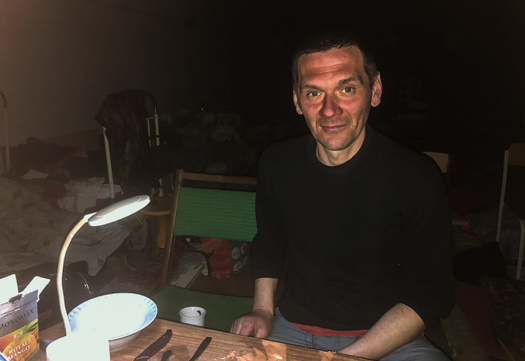
According to Mikhail, they could die at any moment; it’s just a matter of chance. “Today, I went to boil some water at [my friend] Sasha’s. Yesterday, he buried his daughter and son-in-law. A 30-year-old woman, hit by shrapnel. He dug the hole, put them in it, and buried them, all by himself. He paid 12 [thousand hryvnias — a little over $400] and some change for two crosses and two coffins, can you imagine? That’s a lot.”
Breakfast
The only Telegram message I manage to send from Chernihiv goes out at dawn one day — from the roof of the school. The generators that power the cell towers are given some fuel early in the morning, Alexander Malets explains: “Messages get sent at the first burst of signal.”
Around that time, at about six in the morning, someone’s dog starts running around the school’s first floor. Clothes that students left behind on the last day before the war hang in the coatroom.
On the third day of the war, February 26, high school student Ivan Matsuta turned 17. Before the war, Matsuta studied here, going down to the basement for his Defending the Fatherland lessons. Now he lives here. Every morning, he goes into one of the classrooms to update the calendar he keeps on the chalkboard. Under the heading “War,” he writes the new date — and crosses out yesterday’s.
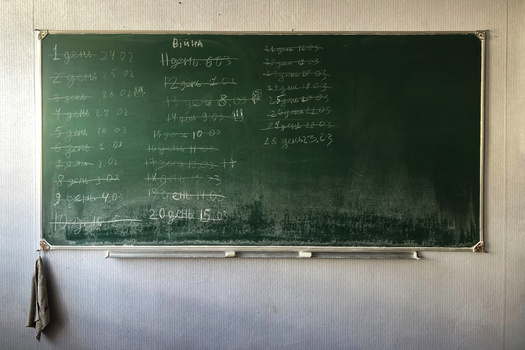
“I thought that if the school gets bombed, the people who sort through the rubble would be able to find this chalkboard,” says Matsuta, “and see how many days we held out for.”
The dates on the board take up several columns already. Several of them have special signs: a flower next to March 8 (International Women’s Day), a cake with three candles, and two hastily drawn crucifixes.
"February 26 and March 9 are our birthdays — mine and my girlfriend's," he explains. "And on the morning of the 12th, on the 17th day of the war, they told me my grandfather and my cousin had died. A shell hit my grandpa's house in Novoselovka, where there was heavy fighting, and he was crushed by a wall. And my brother is a soldier: he was killed fighting Russian soldiers near Kiselevka."
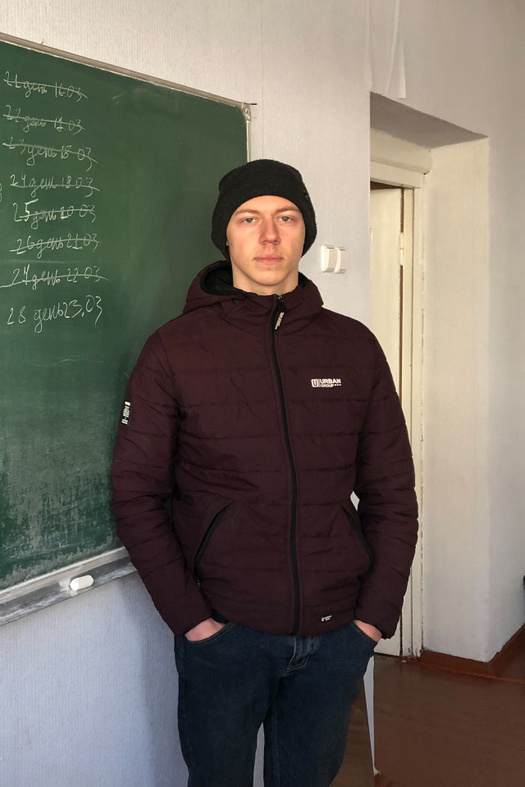
Matsuta got the keys to the class from the office of his dad, the school’s caretaker. On the first day of war, they worked together to clean up the building and get it ready for people to move in. Since leaving the city, Vladimir has managed everything for the school, including getting water, bread, and electricity for the basement’s current inhabitants.
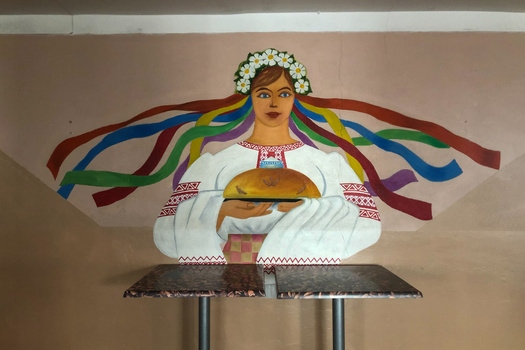
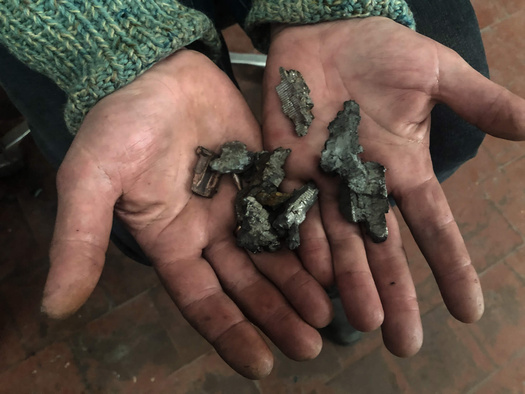
Chernihiv has almost no potable water left.
The residents left in the city have started getting water from a heat pipeline and collecting it from the Strizhen river, volunteer Alexander Malets told Meduza.
The water that caretaker Vladimir Urodov was supplying to the school ran out on March 23; he had been getting it from a private home near the Strizhen. “The building itself, it turns out, is lower than the entire rest of the city — and the water that was still in the pipes was just naturally flowing into the home,” he explained. “Three days ago, there was still some to gather, but yesterday I went to check — and there are only drops left.”
Urodov is still hoping to pump some water from some local wells, but that won’t be possible without electricity: “There’s just not power to pump water right now. If the power comes back, we’ll have water, too.”
Every morning, Vladimir cooks breakfast for his wife, Olga. She’s currently living at her workplace, a maternity hospital. The food there is only for new mothers. Urodov sautes a finely-chopped red pepper, cracking five eggs on top. Then he puts the omelet in a plastic bowl and wraps it in a towel to keep it warm.
The ingredients required 50 miles of driving around the city and a number of barters. “The eggs are from an acquaintance who lives in a private area on Podusovka — his chickens still lay a few. I brought him some bread, and he gave me a dozen eggs,” says Vladimir. “I get the bread because I’ve gotten to know the people at the bakery. They ordered some medicine, and our people [at the bomb shelter] went all over the different pharmacies and waited in lines. The vegetables are because I was driving by the school where the humanitarian aid people brought a whole truck of peppers — and I know the director.”
The freezer where the vegetables are stored is powered by a gas generator that Urodov borrows from a friend from a garage co-op every few days. The gas stove that he now keeps in his office was taken from his dacha. “There was a mine near the bridge — so I went around it,” says Urodov, then sighs: “What else can you do?”
Urodov’s dark blue Zhiguli runs on gasoline: in the car’s tiny trunk, between spare tire and a jack, there’s a tank labeled “propane.” Getting your hands on any other kind of fuel is almost impossible, he explains — at least for civilians. He keeps the remaining gas in the car with him. “The light’s come on — I have maybe a liter left,” he says.
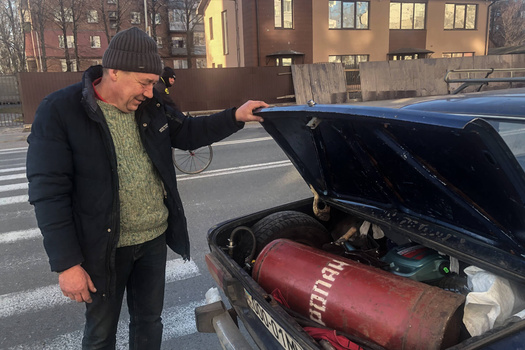
Urodov’s main task this morning is to bring the omelet to his wife at the maternity hospital. On the water, he checks on several lines he stood in this morning.
“First, they fuel up the first responders, the soldiers, the police. Then, when the sun’s already up, citizens. No more than 10 [people in line] get gas. But today, I was number seven, so I got plenty. See, look — they ran out.” Urodov points at a line of about 50 cars that snakes around the corner. “I left my tank with some people to make sure I wasn’t wasting my time in line.”
Chernihiv residents are constantly in search of bread, water, batteries, generators, medicine, and fuel. Anybody without a car — or without fuel to power it — is forced to go by foot, residents told Meduza.
“How does our morning begin?” said Maria, a bomb shelter resident. “As soon as we get up, we’re off — off to find water, to find bread, to find cigarettes. First you go to Streletskaya — people sell bread from their cars there. And it’s always random! They might bring 20 loaves from a private bakery — but there are 30 people in line.”
“They bring [groceries] to the neighborhoods,” she said. “To Remzavod, to Streletskaya, to Kazanskaya. If there's gunfire going on and it’s too scary to walk a long distance, you can go somewhere nearby. If you go somewhere and they don’t have what you want, you get something else — so it’s not a total waste, and then you can trade it.”
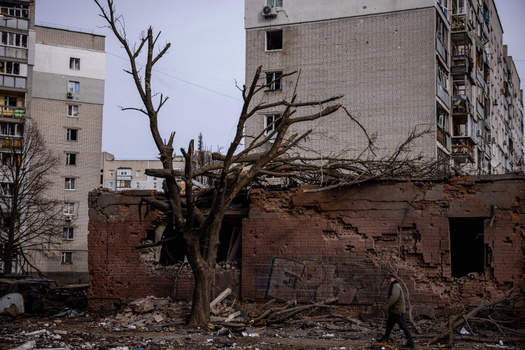
On a straight part of his route, Vladimir Urodov turns off his car, letting it coast for several blocks. “Why burn fuel for nothing?” he says. We pass the line at the bakery — we’ll have to return after 2:00 pm.
18 people have died waiting in lines for bread and water (the Russian Defense Ministry denied its involvement in these deaths). “We’re about to pass the spot where my buddy was killed,” Vladimir says. “He was standing in line outside of that store. And a piece of shrapnel hit him.”
The Chernihiv maternity hospital has been shelled as well. The bomb landed right in the hospital courtyard, destroying the curb; the pregnant women in the bomb shelter under the building could feel the walls shaking. Olga, Vladimir’s wife, was ironing linens when it hit.
When we get to the hospital, Olga comes out to meet Vladimir. She’s crying. None of her calls have gone through for an entire day, and she thought something might have happened to him. (A week ago, Olga learned that her father, who had also stopped answering the phone, had died. He’d been dead for three days by the time a neighbor finally managed to reach Novoselovka and notify Olga.)
The medical equipment in the NICU is now powered by generators. Newborn babies are brought down to the building’s bomb shelter to protect them from shelling. One of the delivery beds has been moved to the hallway. “The walls are load-bearing, there are no windows, and if the building collapses, it will be more secure,” said senior obstetrician Vera Tselik. She hasn’t left the building since the war began.
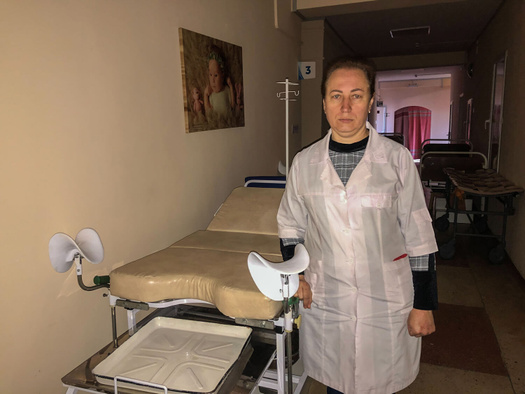
The hospital does have a basement and a bomb shelter, Tselik clarified, but they tried not to bring women there for childbirth. “The women say it’s [psychologically] difficult to give birth in a basement,” she explained. “And even harder in a bomb shelter.”
New mothers usually go to the bomb shelter — which is hermetically sealed — immediately after giving birth. Viktoria Doroshenko came here on January 25 and has been here ever since. “It’s cold, it’s scary, but what am I supposed to do? I’m from Pryluky, and I need to give birth [here] because there’s no NICU in Pryluky,” said Doroshenko. “The doctors say everything’s going to be okay and that I shouldn’t worry — but how can I not worry? It’s still scary. This is my third [child]. My first two were boys, and they say this one’s a fellow, too. I’m still thinking about the name. His dad said, “If he gets born, we’ll name him then.”
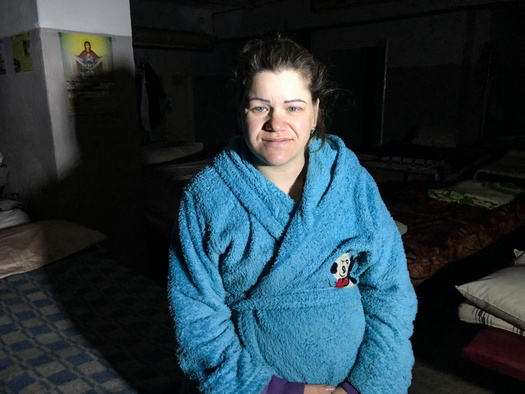
Chernihiv’s curfew causes problems, too: sometimes contractions start at night, when women can no longer get to the hospital. “There are checkpoints at night so you can’t go anywhere, but one of my heroic neighbors took things into his own hands and brought us at night to the hospital,” said another woman in the bomb shelter whose name is also Viktoria. “They took us in and kept us in the bunker until the morning. I was having contractions the whole time. Then the doctor came and did a C-section. [During childbirth,] you just disconnect, psychologically; I wasn’t thinking about the shelling — I was thinking about my baby.”
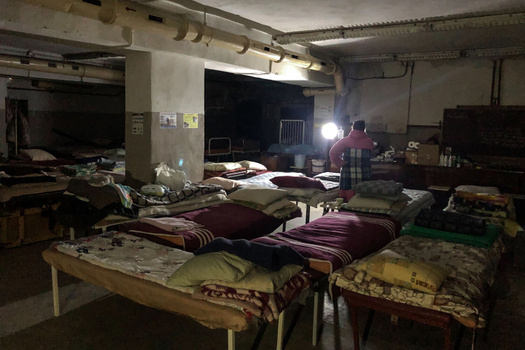
Irina has been in the hospital’s bomb shelter for a month now. “I came here before the war — and I’m still here,” she told Meduza. “What I really want is for this all to end soon — I just don’t have the strength. My husband is a soldier. Here, in Chernihiv. They let him visit me for 10 minutes at a time. He says everything will be okay, but I think he’s just comforting me because he won’t tell me anything else.”
“The only thing keeping us going is the hope that one day, we’ll get up, and they’ll tell us we’ve won,” said Irina.
‘Here it is — death’
The bomb crater in the courtyard in front of the apartment building on Viacheslav Chornovil stret is almost deep enough to stand upright in, including your head. The neighboring one has a similar hole in its lawn. The buildings came under fire on the afternoon of March 3; 47 people died.
The explosions blew out reinforced windows and scorched the apartments. The siding that was on the end of building No. 15 looks like it was sheared off. From the street, you can see the inside of a second-story bedroom: an adult-size bed with a cradle at its foot. On the fourth story, the side of a wardrobe was blown off along with the wall, though the clothes and the tie sticking out of it look untouched. On the seventh floor, an electric stove is hanging down from the eighth floor, held on by an electric wire.
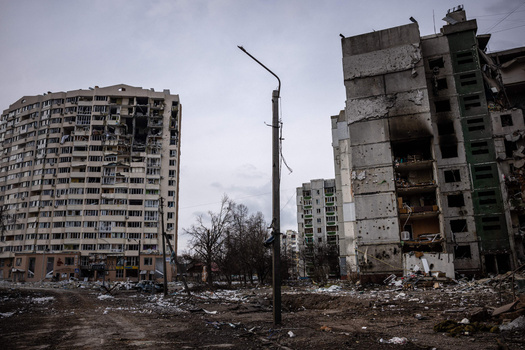
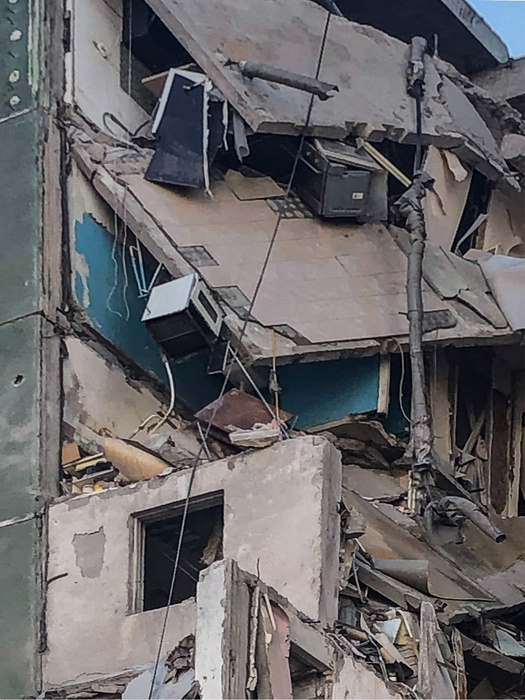
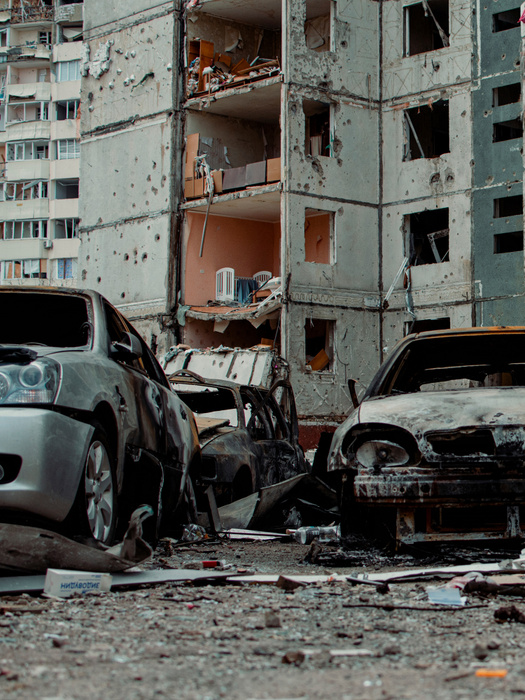
According to witnesses, the shelling in the region lasted from March 11 to March 17.
On March 11, Chernihiv residents Yulia and Alexander decided to get out of the city to find a working pharmacy. During the shelling, they found themselves “in the middle of a long, nine-story building” on Chornovol Street.
“I got hit somewhere,” says Yulia, who tends to speak in short sentences due to a lung surgery. “I started losing feeling in my arms, in my legs. I was totally stunned. And my husband shouted, ‘Zaya, don’t die!’ And I just looked at the sky. I thought about my daughter. Because I couldn’t feel my body anymore. I just looked at the sky — and nothing hurt anymore: ‘Here it is — death.’ I also thought I was about to wake up — and none of it would be real, everything would be okay. But it wasn’t true.”
On March 17, on Pirogov Street — a 10-minute walk from the spot where Yulia was hit — 85-year-old Chernihiv resident Viktor Bichek was killed.
“He and I were walking to the hospital to charge his phone,” says Larisa Primakova, Bichek’s longtime partner. “And it was like a whistle! And this woman landed on me from behind — she’d either fallen or twisted her ankle, but she landed right on my back. And Viktor was there! He should have been on the ground, but he was standing. I thought it would buzz past him, but the wave knocked him down. And it cut a hole in his right side. As deep as a cup.”
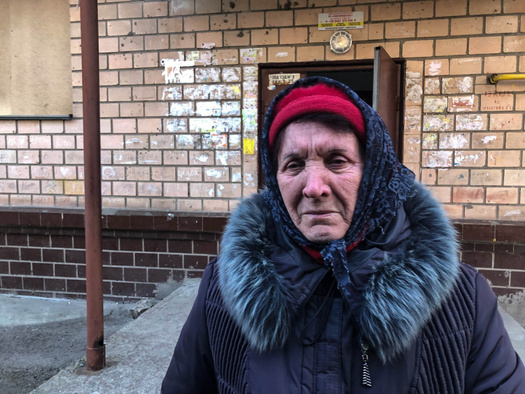
Viktor was quickly buried in a temporary cemetery. “They’ve already buried him — without me. Nobody informs anybody,” says Primakova. “All they said was that when this [the war] is over, I need to go to the regional hospital and ask them for his registration number [at the morgue]. Then I need to find the label for that number at the cemetery.”
The city’s main cemetery is currently located in a combat zone, so residents have been burying people in the Yalovshchinsky Forest in the north of Chernihiv. The trenches where the bodies are placed are dug by a bulldozer. The tracks it leaves behind form a path between the city’s cemeteries.
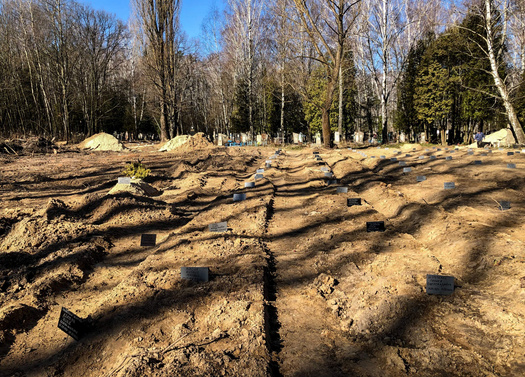
The piles of fresh dirt in the temporary cemetery are marked only with gray signs. There are no ceremonies. “The only people here are workers,” says a volunteer named Artem. He helps clear land for the burials. “And a record-keeper, who makes sure there’s at least some kind of plan. She’s just a woman who walks through and records people’s names and birth years so that after the war, we’ll be able to figure out who’s lying where and rebury them.”
Despite active shelling, many people come here to visit their relatives. Sand has been brought in for people who want to make sure their loved ones’ temporary graves are well-maintained. People bring their own crosses.
Retiree Alexander Yermak came to tend the grave of his mother in law, Valentina Pinchuk. “I came to at least add a small hill,” he explained. “Zhinka’s mother was 92 years old. She died at home, they brought her to the second morgue, and we never saw her again.”

The family wasn’t given any time to say goodbye to Pinchuk because she was taken away with no warning. “I don’t even know if they changed her into the clothes we gave them or not,” says Yermak. “But we found her from her sign.”
The Russian Defense Ministry didn’t respond to Meduza’s questions about the shelling of Chernihiv.
The morgue
An older couple, leaning over the registry of the city’s dead, seems to cheer up for a moment. On March 22, they were told that their son, a soldier, had been brought here — to the morgue at the Chernihiv Regional Hospital. But the nurse in charge of records can’t seem to find his last name.
“Relax, I don’t have a soldier with that name,” Yelena repeats. “I’m looking at it. I remember all of the names. The last soldier I got was on the 17th. Since the 17th, there haven’t been any soldiers.”
The soldier’s mother takes a half step away from the desk. “It could have been earlier than that,” her husband mutters, before catching sight of his own last name. A second later, he lets out a groan: “There he is — Alexander Boichuk.”
His wife starts to cry.
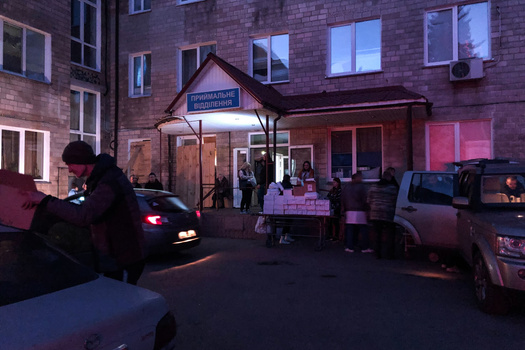
Earlier today, March 22, when the Boichukov family first arrived at the hospital, they went to the emergency room, where injured soldiers are brought. Then they were sent to the morgue.
“They were searching for him alive, of course. They didn’t go to the morgue, they went to the treatment ward. They asked to look at the lists there, among the living,” says Chernihiv resident Leonid Andreichenko. His son Vladimir, who served on the tank evacuation team, also died on March 16; he was the one who hauled Boichuk’s body off of the battlefield.
“I just happened to run into them here,” says Andreichenko. “They said their last name was Boichuk [in the waiting room] — and I just came here yesterday to copy down the names of the people whose bodies my son brought back [from the front]. And I remembered seeing that last name. I remembered there was a Boichuk.”
According to his father and the nurse at the morgue, Vladimir Andreichenko managed to bring eight fallen soldiers back from the front. But on March 16, he came under machine gun and mortar fire in Novoselovka — and nobody has been able to retrieve his body.
“So he’s lying there to this day. Today is the sixth day,” says Leonid Andreichenko. “I want to go get him — it’s the sixth day, do you understand? I’m not afraid of anything — I can go get his remains if I have to. But nobody will help me get there in that weather. But the shelling. Although what’s left to retrieve after the shelling — I’m afraid to see what’s there.”
* * *
Just outside the facility, I stumble upon a rusted gurney with a body in a long polyethylene bag. Behind it, in the doorway, is one more gurney; behind that one is another. The path into the facility is completely full of gurneys.
Soldiers and civilians are stored together. “We’re taking everyone right now — cleaning everything,” says Yelena, deftly squeezing between the gurneys into the cool morgue chamber. “They brought these this morning, that’s why it’s so many. I don’t have time to record them all.”
The smell in the chamber is a bit sweet and completely unfamiliar. “Careful behind you,” warns Valery, the head physician, when I step back towards the wall: it turns out there bodies stacked up against it in several neat rows.
On the top bag, the words “We bury” are written in white marker; it means that the forensic medical bureau itself is responsible for burying the bodies in the temporary cemetery.
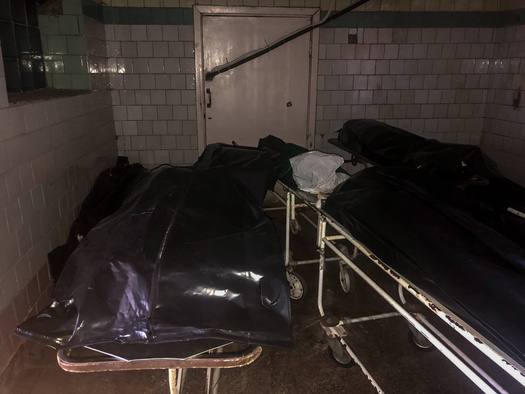
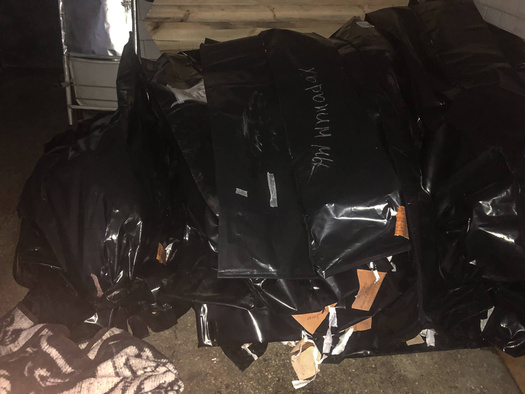
One of the bodies on a gurney is noticeably smaller than the rest. “We have an eight-year-old child lying here — he died from a mortar attack, and his father is still in intensive care, in critical condition,” says Valery. “It’s awful to look at. Even for me, with 29 years of experience. When, in fact, my grandchildren… It’s hard.”
This is the only body the morgue workers have dressed in clothes; the rest are put in bags or wrapped in blankets. The clothes they had available — a women’s socks, a pair of jeans, and a “Save the Trees” sweatshirt — were all too big, so Yelena, who embalms the bodies, brought an outfit in herself.
“How did I dress him? I went out, I asked around, and I found some clothes,” says Yelena. “His parents just don’t have anything. The parents are in the hospital [from the same shelling], too.”
The morgue freezers don’t work without electricity; the walls keep the temperature in the chamber at about “nine degrees” [about 48 degrees Fahrenheit], according to Valery. As a result, they’ve started embalming people. “It’s to save [the child’s body] — who knows when they’ll pick him up,” says Valery. “We’ll maintain it until the end.”
The child’s head is wrapped in a bag from the grocery store. His hands are wrapped in bandages. “There’s formalin — you see?” Yelena asks. “So it lasts longer. We gave him a mask.”
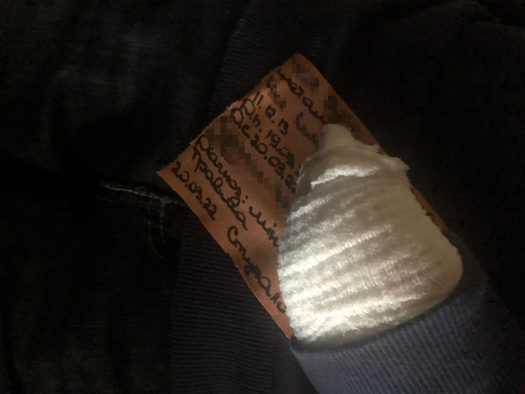
The formalin stings my eyes. “But this one was only [we did so thoroughly] because he’s a child — we can’t do them all like that, it’s physically difficult,” says Yelena.
A pink card is tied to the child’s bandaged hands, which he seems to be holding close to his stomach. The card reads, “Birth year: 2013; Entry date: March 19 at 12:55; Death date: March 20 at 13:00. Diagnosis: mine explosion injury.”
'There’s no need to tell him yet'
Mikhail Chekh, the father of the child who died from the “mine explosion injury,” is in the ICU. He looks very young. His bare shoulders are visible from under his woolen hospital blanket; a large bruise extends from his collarbone down his back. Surgeon Stanislav Kovalenko describes his condition as “semi-oblivious.”
With injuries on his right hand, multiple shrapnel wounds, blood loss, and shock, Chekh is delicate right now and I shouldn’t try talking to him, says anesthesiologist Gennady Stukalo.
During our conversation, Chekh’s gaze is unfocused; he keeps shifting his eyes up to the ceiling. “This was four days ago. Daytime, lunchtime,” he then says, shaking his head violently. Every word seems to require a lot of effort. “Lunchtime, because we got gas, then we went to Rokossovsky [Street], then came home — we were going to get some water. Because there was no water. Anywhere.”
The shelling caught the family outside of the Troitsky Cathedral, when they were already on their way back to the shelter. “We’d been living with our friends for 20 days already — since the very beginning. Because they had a good basement, a solid building. There… give me some water,” says Mikhail, trying to reach for his cup. “It’s in the corner of a five-story building, a three story, a five-story building. I parked the car between the buildings.”
Chekh coughs, then continues with unexpected force. “When the explosion hit, I saw… And the explosion broke me. I fell on the curb.” His face becomes distorted. “I turn around, turn towards my wife — and there’s a shot. Where the shot came from, I don’t remember. But the strike just broke my whole body.”
There are currently about 150 people with injuries in the surgery department, according to Andrey Linnik; about 30-40 new ones are added each day. Multiple teams of doctors specializing in various fields fought for two and a half days to save Mikhail Chekh’s son.
“There were multiple critical injuries. Vascular surgeons operated on him, and we were involved in diagnosing his chest injuries,” says Oleg Luzan, head of the Thoracic Surgery department.
“He had critical injuries on his lower limbs,” says surgeon Stanislav Kovalenko, “and traumatologists did several surgeries, but…” he trails off. “It’s hard to say what kind of explosion it was — shells or or mines. You’d have to be a military expert.”
Mikhal Chekh still doesn’t know about his son’s death. “And there’s no reason to tell him yet,” says Gennady Stukalo, his attending physician.
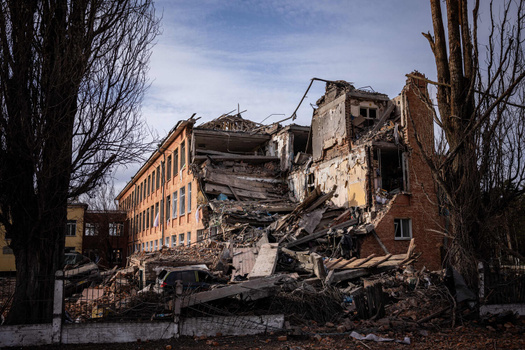
The last bridge
On the night of March 23, Russian troops bomb a bridge over the Desna River that was previously used to transport food and fuel to the city. “The blast was really strong,” says Chernihiv resident Yelena, who had already been awoken by an air raid. “I’d just gotten on the ground when there was another blast, also really strong. It was exactly 12:20.”
12 hours later, Yelena and I have to flee the city.
The Russian Defense Ministry did not respond to Meduza’s questions about the destruction of the bridge over the Desna.
Earlier, on March 24, the agency accused the Chernihiv authorities of destroying the bridge.
According to Colonel-General Mikhail Mizintsev, head of the Russian National Defense Control Center, the bridge was bombed “at the instruction of the heads of Chernihiv” “so that local residents would not be able to leave the city.”
The bridge’s destruction leaves Chernihiv isolated — something the city’s residents realized immediately. “Food, fuel, everything will disappear,” Vladimir Urodov tells me minutes after the explosion. “And if fuel deliveries stop, we’ll lose contact [with the outside world],” adds volunteer Alexander Malets. “They [the Russian army] are doing everything they can to make the city dry up like a river.”
By midday, the news has spread around the city — and in the historic center, under the ruins of the city’s medieval fortifications, a crowd is gathering. People are trying to leave the city by taking the one route that’s left: the pedestrian bridge over the Desna, not far from here. The soldiers, policemen, and territorial defense fighters on duty explain to people that movement towards Kyiv is still banned due to a “high likelihood of shelling.”
That’s when the heaviest fire I witness in Chernihiv begins. The Ukrainian air defense forces fire what looks like “a whole battery of missiles,” according to Malets, though he doesn’t know what kind of attack they’re defending against. “The pedestrian bridge is the last thing keeping the city from being completely surrounded,” ventures volunteer Anastasia Koritskaya.
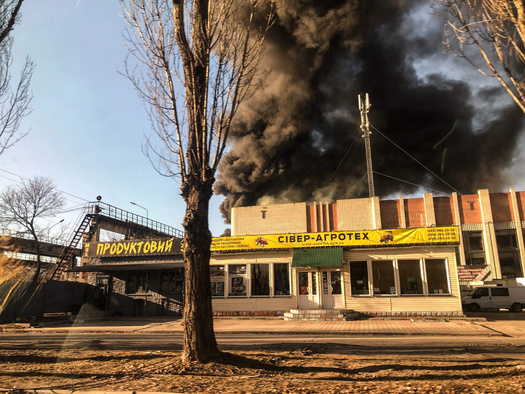
Alexander Malets and Anastasia Koritskaya are engaged — they’ve spent a month of war together, retrieving medicine and food for residents of the besieged Chernihiv. Now they’re deliberating in hushed voices, trying to decide the best way to get their loved ones, who are spread all over the city, out of it, and they look truly worried.
“Sasha only has a few relatives, but I have a lot,” says Koritskaya. “They have two [liters] of gasoline — where can they go?” The couple themselves have no plans to leave. “We’ll leave when the last machine guns do,” says Malets.
He goes in the car to get his relatives: he’s decided to take his grandmother and grandfather out of the city immediately. Koritskaya stays behind. Yesterday, she was at a briefing for volunteers and the city administration where they discussed the future of Chernihiv. When she took a smoke break, she noticed some blood on her cigarette. “I clench my jaw when I’m nervous… My gums were bleeding. They were telling us how good or bad everything looks — and what we’ll do next,” she says.
“I also got my hands on some dry shampoo yesterday,” she says, suddenly switching topics. “I washed [both my and Sasha’s] hair yesterday, and look how soft Sasha’s turned out!” She shows me a photo, and I see Sasha with neatly arranged bangs for the first time.

Anastasia and Alexander got engaged in December 2021, and they planned to choose a wedding date in March. Koritskaya had already tried on her dress, planned her hairstyle, and chosen a design for their engagement rings, which were going to be made in Lviv — but hadn’t yet chosen a witness or the color of the bouquets for the bridesmaids.
Anastasia Koritskaya is 22 years old. Since the war began, she’s lost a lot of weight, cut her nails down short, and gotten blisters on her feet. “I ended up wearing shoes that aren’t mine,” she explained. She’s run out of medicine for her headaches, which continue to get worse. It scares her to imagine what will happen to access to more urgent medications now that the bridge has been blown up.
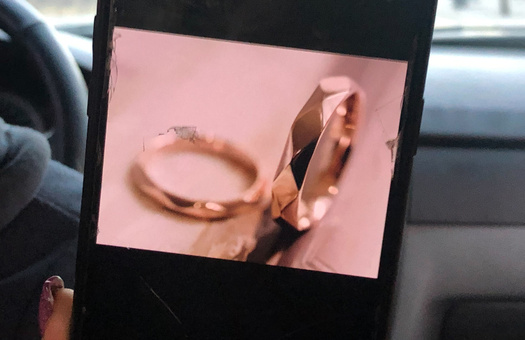
Half an hour later, the authorities start allowing people to cross the pedestrian bridge. People in the crowd call out for each other, someone’s parrot keeps chirping, and dogs try to pull their owners back home.
“Men cannot pass — only women and children,” say the guards on duty. “Men need to go back.” This means that Alexander’s grandfather, despite his age, won’t be allowed to leave the city. “And Alexander’s grandmother won’t go without him,” says Anastasia.
In the end, I leave the city alone. About a hundred meters short of the bridge, a family stands at the fence of a house: two women, a man, and a young girl. They anxiously watch as people stream by.
“Of course we’re afraid of Chernihiv being surrounded. I went completely gray on the first day of the war,” says a brunette, bending down to show me a faded tuft of hair. “But where will I leave my old mother? She’s 93 and bedridden.”
In front of the pedestrian bridge is the last checkpoint — the one sending all the men back into the city. A four-year-old boy cries as he gets separated from his father. “I won’t go without my son,” says a woman, rushing towards the security guards. “Why didn’t we do this sooner?” says a young woman, banging her fists on her husband’s chest, before leaving him in Chernihiv.
* * *
Early on the morning of March 23, Tatyana, who lives in the school’s basement, told me she was playing to evacuate her family from Chernihiv; she hadn’t heard about the bridge getting bombed yet. Yulia, who was wounded by the shelling on Chornovol Street, planned to go to Kyiv as soon as she was discharged from the hospital. Viktoria, who I met in the bomb shelter at the maternity hospital, was waiting for her children to be born; then she planned to leave the city. “It’s not safe to stay here with a small child,” she says.
It’s now impossible to leave the city. The pedestrian bridge is closed because of constant Russian shelling (the Russian Defense Ministry did not respond to Meduza’s questions). The isolated city has no way to receive humanitarian aid. “As soon as someone appears on the bridge, the mortar fire begins,” said volunteer Vyacheslav Zaporozhets, who evacuated people from Chernihiv before the Russian army cut off the only exit.
On the night of March 25, someone tried to take a boat across the Desna. “This guy took a boat and rowed to the pedestrian bridge,” said Zaporozhets. “They fired at him, too. Now he’s cargo 200.”
Story by Lilia Yapparova, reporting from Chernihiv, Ukraine
Translation by Sam Breazeale
(1) Wolf and Chipmunk
The Ukrainian soldiers asked us to use their call names for this article.
(2) 200s
"Cargo 200" is a Russian military term that refers to dead bodies being transported to a burial site. A "200" refers to a dead body.
(3) Mineral spirits
Mineral spirits, also called white spirit, are a gasoline solvent that can be used as an alternative to kerosene.
(4) Alexander Boichuk
His name was changed for this story.
(5) When was this?
Meduza's correspondent spoke to Andreichenko on March 22, 2022.
(6) Valery
The head physician asked us to use only his first name for this story.
(7) Why?
Any man who wanted to leave the city on March 23 needed to show a certificate of withdrawal from the military in Chenihiv, according to the guards at the blockpost. Almost nobody had such a certificate.